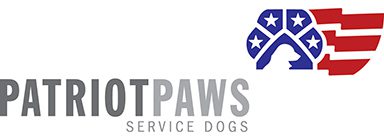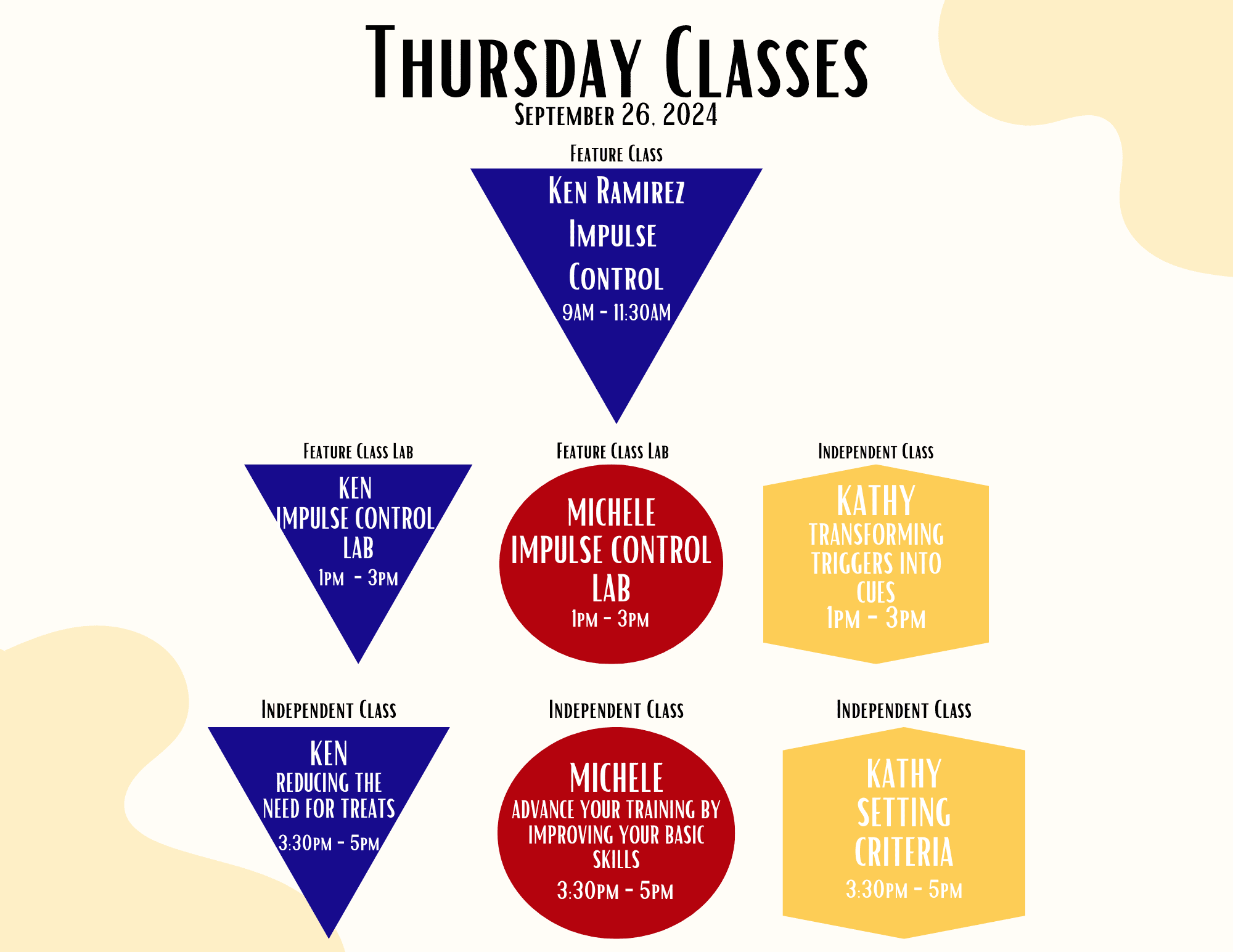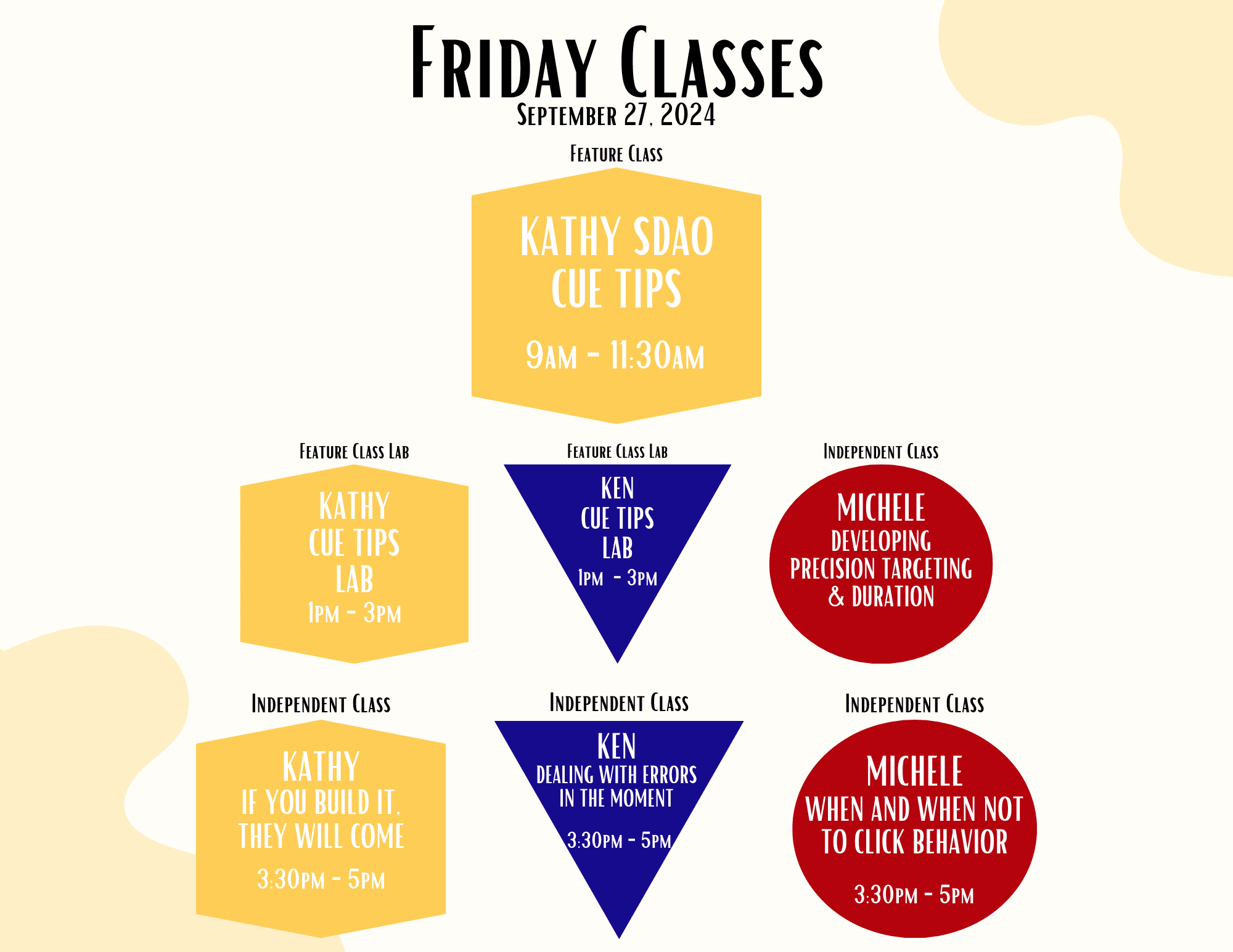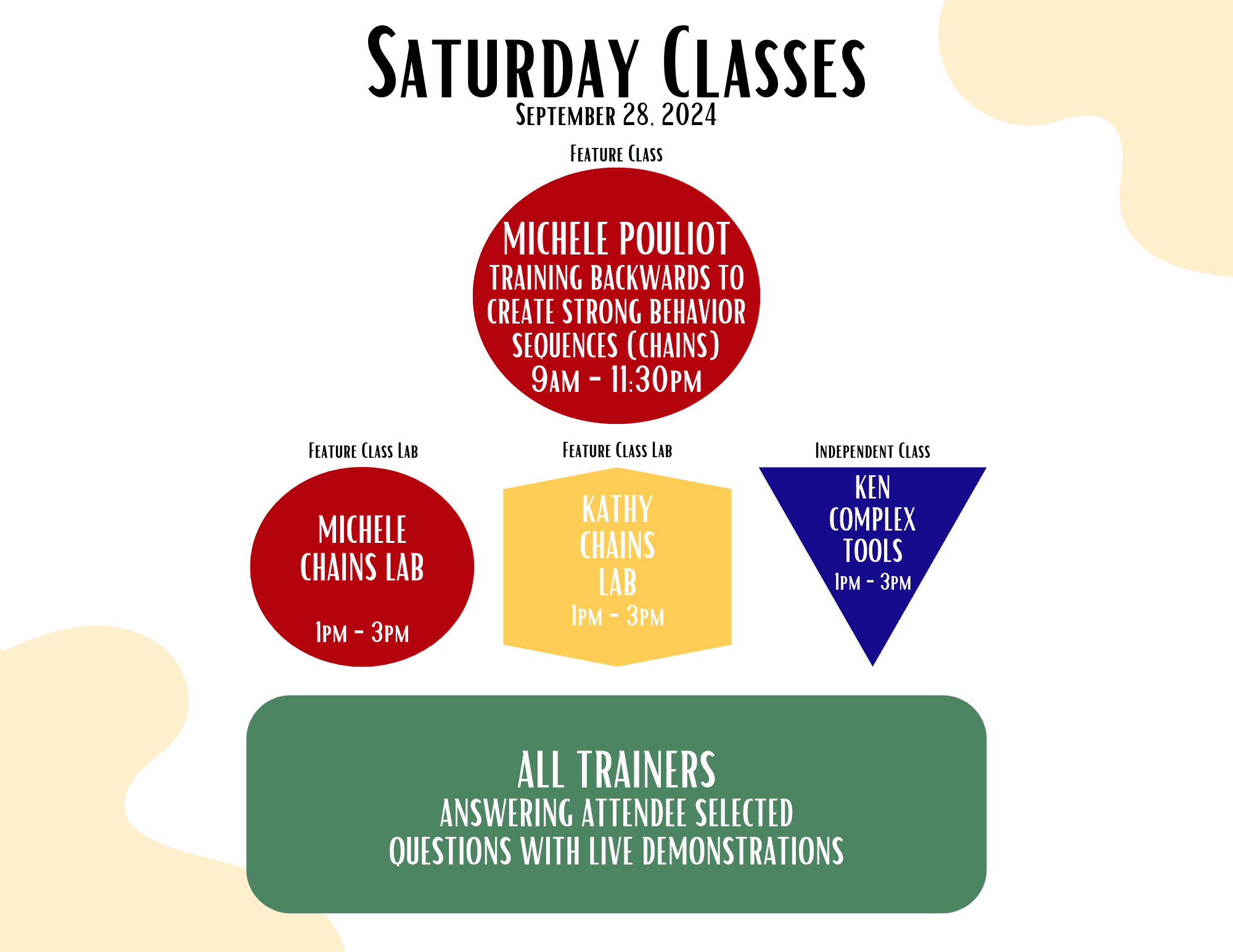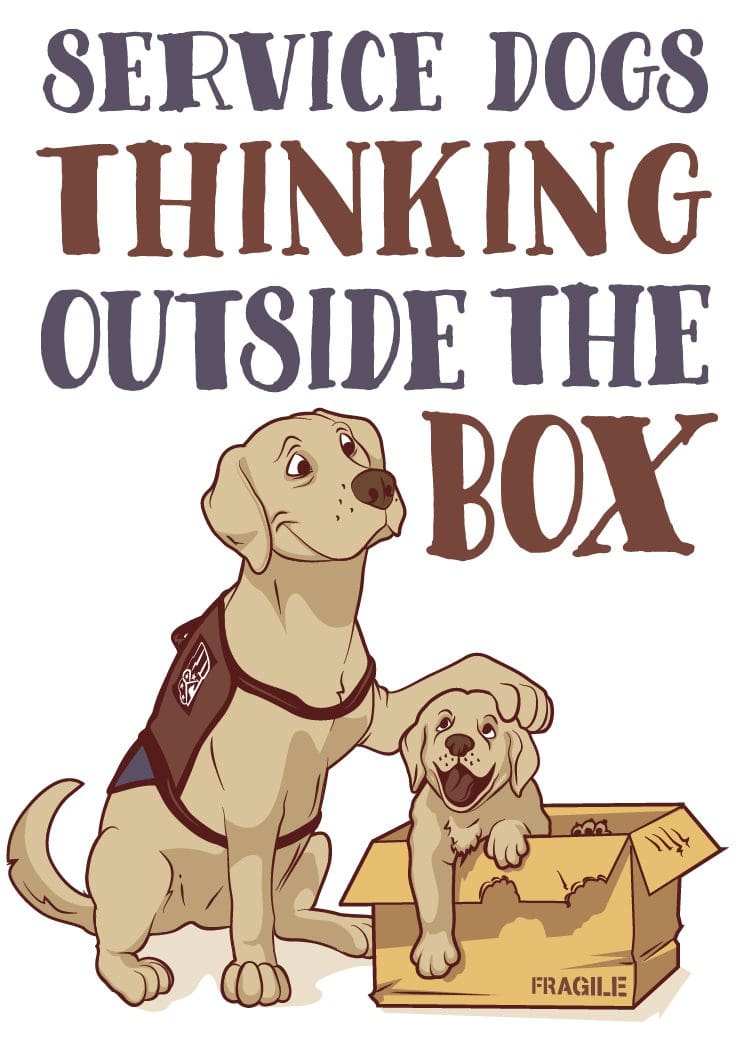
Patriot PAWS Service Dogs Presents
“Thinking Outside The Box”
A Training Workshop For Professional
Service Dog Trainers Like You
For More Travel Information
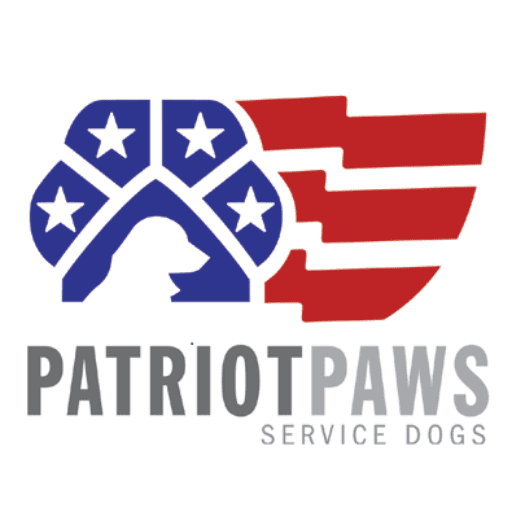
Save The Date!
2024 – September 26th, 27th & 28th
This Training Workshop Qualifies For 15 Continuous education units (CEU)
Dive into the World of Service Dog Training with Patriot PAWS!
Join us from September 26th to 28th, 2024, for an immersive 3-day workshop experience, tailor-made for Service Dog Organizations and Professional Trainers like YOU. Learn from the best in the business: Ken Ramirez, Kathy Sdao, and Michele Pouliot. This is your golden opportunity to get hands-on training with live demonstrations from these world-renowned trainers. Elevate your skills, understand the nuances of the craft, and witness the magic of professional service dog training up close. Special offer: Early Bird Registration begins March 1st, 2024 and ends May 31st, 2024, snag your spot for just $500 (regular price $595)! Dont miss out on this enriching journey to become the best service dog trainer you can be.
Meet your world-renowned Trainers!
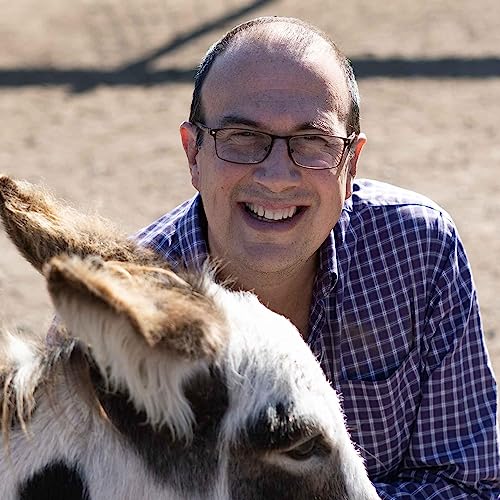
Ken Ramirez

Kathy Sdao
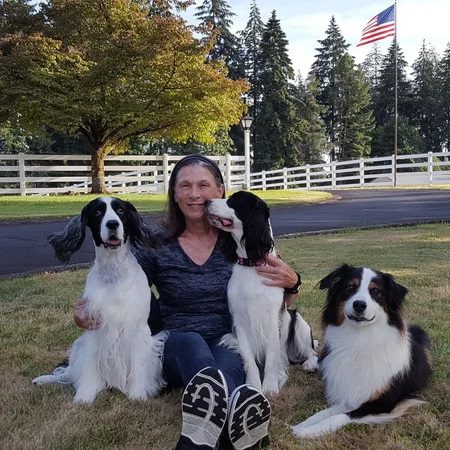
Michele Pouliot
A 40+ year veteran of animal care and training, Ramirez is a biologist and animal behaviorist who served nine years at Marineworld of Texas. He also was a trainer and coordinator at Ocean Safari in South Padre Island, Texas, as well as acting as a consultant to many zoo and aquarium programs throughout the world. He began his training career working with guide dogs for the visually impaired and has maintained a close affiliation to pet training throughout his career. He hosted two successful seasons of the pet training television series Talk to the Animals that compared pet training to the important work done with training and caring for animals in zoological facilities. He has also recently worked closely with several search and rescue dog organizations, service dog groups, as well as with bomb and narcotic dogs.
Since 2005, Ken has brought his experience as a trainer of many cognitive projects with marine mammals and primates to the dog arena. Most notable has been his work with modifier cues, adduction, matching to sample, mimicry, and counting. The latter two projects: teaching dogs to mimic or imitate other dogs; and to learn the concept of counting are in the process of being prepared for scientific publication. Both of these projects have documented cognitive abilities in dogs that have not been previously well documented or understood.
Ramirez has been active in several professional organizations, including the International Marine Animal Trainers Association (IMATA), of which he is a past president. Ken has been actively involved in the creation of a certification process for animal trainers in zoological settings. He has been on the faculty of Karen Pryor's Clicker Expos since 2005.
Since selling Puget Hound in 1998, Kathy has owned and managed Bright Spot Dog Training. Services include consulting with families about their challenging dogs, teaching private lessons to dogs and their owners, and coaching novices and professionals to cross over to positive-reinforcement training. In addition, she has trained animal actors, written for The Clicker Journal and the Seattle Times, consulted with Guide Dogs for the Blind and with Susquehanna Service Dogs, served as a subject-matter expert for the Delta Society's Service Dog Education System and taught at the Instructor Training Courses hosted by Dogs of Course. And, in a moment, Kathy appeared as the Way Cool Scientist on an episode of the television show Bill Nye the Science Guy. Kathy is proud to be one of the original faculty members for Karen Pryor's long-running ClickerExpos and has taught at forty of these popular conferences since 2003.
Kathy also has traveled across the United States, Canada & Europe, and to Australia, Israel, Japan and Mexico, educating students about the science of animal training. She's taught more than 300 seminars, workshops, conference presentations & webinars, enjoying these opportunities to share her passion for the incredible power of positive-reinforcement training, confirmed over decades of working with dozens of species.
In 2016, Michele retired from her 42-year career as a guide dog mobility instructor with Guide Dogs for the Blind, the largest North American guide dog school. She personally trained over 350 guide dog teams during her career. Before entering the guide dog field, she was a professional in equestrian disciplines, mentoring under Linda Tellington Jones.
Michele is sought after for her seminars and workshops due to her clarity of instruction and entertaining style of presentation. Over her 51+ years of animal training, she has presented scores of seminars across North America and abroad. Michele has been a driving force in bringing science based Clicker Training to the entire guide dog training industry. She has extensively promoted the adoption of positive reinforcement methods internationally within the guide and service dog fields. The International Guide Dog Federation presented Michele with a lifetime achievement award, in 2016, for her global work to improve programs by maximizing positive reinforcement methods.
Class Schedule
Instructor Color Key
Day 1 - Thursday, September 26th, 2024
7:30AM - 8:30AM
Welcome Breakfast
Full breakfast sponsored by Patriot PAWS Service Dogs.
9:00AM - 11:30AM
Feature Class - Impulse Control
- Instructor – Ken Ramirez
- Description –Stimulus Control, Generalization, and Desensitization Done Well
Every working dog trainer desires good impulse control. But what is impulse control? How do you achieve it with reliability? Ken spends much of his consulting life sharing techniques for gaining control over the unexpected. Teaching animals to stay on task and focused despite the many distractions that are present in real world working dog environments. Ken will share desensitization techniques that will help you prepare your dog for working in the most distracting environments.
11:30AM - 1:00PM
Lunch
1:00PM - 3:00PM
Lab - Impulse Control
-
- Instructor – Ken Ramirez
- Description – Stimulus Control, Generalization, and Desensitization Done WellEvery working dog trainer desires good impulse control. But what is impulse control? How do you achieve it with reliability? Ken spends much of his consulting life sharing techniques for gaining control over the unexpected. Teaching animals to stay on task and focused despite the many distractions that are present in real world working dog environments. Ken will share desensitization techniques that will help you prepare your dog for working in the most distracting environments.
Lab - Impulse Control
Instructor – Michele Pouliot
-
- Description – Stimulus Control, Generalization, and Desensitization Done Well – Every working dog trainer desires good impulse control. But what is impulse control? How do you achieve it with reliability? Michele will share techniques for gaining control over the unexpected. Teaching animals to stay on task and focused despite the many distractions that are present in real world working dog environments. Michele will share desensitization techniques that will help you prepare your dog for working in the most distracting environments.
Independent Class - Transforming Triggers Into Cues
- Instructor – Kathy Sdao
- Description – Transferring a familiar cue to a novel cue (e.g., a hand signal to a spoken word) is a standard training exercise, useful in many situations. For example, your dog may have been initially trained to respond to gestures that your new client cannot perform. Yet another application of cue transfers is to teach your dog that something in the environment he perceives as upsetting is actually a cue to perform a well-rehearsed behavior. Through structured practice, you can teach dogs to recognize visual and auditory stimuli (e.g., the appearance of another dog) as reinforcement opportunities rather than problems, producing an upbeat rather than upset attitude.
-
3:30PM - 5:00PM
Independent Class - Reducing the Need for Treats
- Instructor – Ken Ramirez
- Description – As positive reinforcement trainers there is no question that food is on of our most valuable reinforcers. However, we often find ourselves in need of alternative reinforcers. How do we make sure that a game or a toy is truly reinforcing? How do we evaluate a reinforcer’s effectiveness? Is there a way to create alternative reinforcers that can be effective in a working dog environment? Ken will explore these techniques and share strategies for success.
Independent Class - Advance Your Training By Improving Your Basic Skills
- Instructor – Michele Pouliot
- Description – Has your training effectiveness grown over the past year or are you pretty much the same trainer you were 1 year ago?
Positive Reinforcement training techniques may be simple but they are not easy. By identifying weak points in your training skills, one can expand their overall training effectiveness. Effective handling of food reinforcement has a direct affect on training outcomes. This is especially true when final goals include lowering the amount of food reinforcement required while maintaining good behavior responses. This LAB session will focus on trainer skills in the effective handling of reinforcement, including maintaining an awareness of future handler (client) abilities to provide reinforcement.
Independent Class: Setting criteria
- Instructor – Kathy Sdao
- Description – We trainers have the responsibility to make learning successful for our dogs. Errors are discouraging and create drag in the behavioral momentum we want to foster in our dogs. It’s important to choose which movements we’ll reinforce and which we won’t, and to shift these criteria thoughtfully over the course of a training session. We’ll review the rules for setting criteria and apply them to specific behaviors (e.g., greeting people; walking on a loose leash).
-
Day 2 - Friday, September 27th, 2024
7:30AM - 8:30AM
Light Breakfast
Light breakfast sponsored by Patriot PAWS Service Dogs.
9:00AM - 11:30AM
Feature Class - Cue Tips
- Instructor – Kathy Sdao
- Description – Understanding the science and functioning of cues provides a huge boost in our training efficiency. So often we inadvertently give our dogs confusing, threatening or static-laden signals. Their failures to respond immediately and accurately may indicate they lack clear information. So, to improve their welfare and ours, we’ll review several criteria crucial for choosing and maintaining our signals to maximize clarity. This will increase our dogs’ ability to respond fluently, with enthusiasm and precision.
11:30AM - 1:00PM
Lunch
1:00PM - 3:00PM
Lab - Cue Tips
-
- Instructor – Kathy Sdao
- Description –Understanding the science and functioning of cues provides a huge boost in our training efficiency. So often we inadvertently give our dogs confusing, threatening or static-laden signals. Their failures to respond immediately and accurately may indicate they lack clear information. So, to improve their welfare and ours, we’ll review several criteria crucial for choosing and maintaining our signals to maximize clarity. This will increase our dogs’ ability to respond fluently, with enthusiasm and precision.
Lab - Cue Tips
-
- Instructor – Ken Ramirez
- Description –Understanding the science and functioning of cues provides a huge boost in our training efficiency. So often we inadvertently give our dogs confusing, threatening or static-laden signals. Their failures to respond immediately and accurately may indicate they lack clear information. So, to improve their welfare and ours, we’ll review several criteria crucial for choosing and maintaining our signals to maximize clarity. This will increase our dogs’ ability to respond fluently, with enthusiasm and precision.
Independent Class - Developing Precision Targeting and Duration
- Instructor – Michele Pouliot
- Description – Are you challenged with training precision targeting behaviors? Targeting behaviors with Nose,
Chin, Foot and other body parts can be difficult to train if your communication skills are lacking
clarity. Developing duration in targeting skill is often a difficult behavior to train.
Clicker training creates great enthusiasm in the learner which often becomes problematic when
the training goal is precise targeting of a specific body part and/or duration targeting. Active
clawing and biting behavior at goal targets are often accidentally created during the training
process.
This LAB session will focus on creating training sessions that effectively prompt the goal
behavior desired and prevent targeting problems -
3:30PM - 5:00PM
Independent Class: If you build it, they will come
- Instructor – Kathy Sdao
- Description – Many people struggle with teaching dogs to run to them on cue. Though a relatively simple movement, the recall is also a crucial behavior with several key criteria. It’s easy to make mistakes. Yet the power of clicker training is perfectly suited to this task. In this lab, we’ll practice three specific training exercises (i.e., beginning, intermediate & advanced) and provide 10 practical training tips.
-
Independent Class - Dealing with Errors in the Moment
- Instructor – Ken Ramirez
- Description – As a trainer we are always faced with decisions about which tools to employ as we shape new behavior. But what about when an animal makes a mistake. How do we choose the best tools to get rid of unwanted behavior? Especially as a positive reinforcement trainer, how do we avoid the proven functional tools such as punishment? Ken will explore how he, as a working trainer, has managed to avoid the use aversive tools and used more positive alternatives. He will share the tools that are available and explore the benefits and challenges of each tool.
Independent Class - When and When Not to Click Behavior
- Instructor – Michele Pouliot
- Description – Clicker training is quite simple, but not “easy” to execute well. Training sessions are full of instant decisions made by the trainer. Decisions about: Marker Timing, Lowering Criteria, Raising Criteria, Ending Training, Continuing Training, Style of Reinforcement Delivery and
much more. The Click provides us great power in communicating with our learners. This means the trainer
wants to use that power, yet there can be reasons to purposely choose not to use the Marker
or delay its use when training new behaviors. Once a behavior has advanced and is on the goal
cues, when and how is the Click removed from the Behavior > Mark > Reinforce cycle? Once
removed, should it never return? All great questions for this LAB session with Michele.
Day 3 - Saturday, September 28th, 2024
7:30AM - 8:30AM
Light Breakfast
Light breakfast sponsored by Patriot PAWS Service Dogs.
9:00AM - 11:30AM
Feature Class - Training Backwards to Create Strong Behavior Sequences / Chains
- Instructor – Michele Pouliot
- Description – Effective behavior chaining is an important aspect of service dog and guide dog work. Humans instinctively want to train “Forwards” by adding behaviors one after the other (1, 2, 3, 4 and so on). This technique often results in slow learning and can demotivate the pupil during the repetition process. Back Chaining is a technique that makes the chaining process easy for the learner while increasing their motivation at the same time. It is also an effective way to introduce multiple behavior responses before a single reward event. In this presentation and demonstration session, learn how Backwards Chaining several behaviors into a sequence promotes fast learning and motivated responses.
11:30AM - 1:00PM
Thank You For Coming - Lunch
Lunch sponsored by Patriot PAWS Service Dogs.
Thank you for coming!
1:00PM - 3:00PM
Lab - Training Backwards to Create Strong Behavior Sequences / Chains
- Instructor – Michele Pouliot
- Description – Effective behavior chaining is an important aspect of service dog and guide dog work. Humans instinctively want to train “Forwards” by adding behaviors one after the other (1, 2, 3, 4 and so on). This technique often results in slow learning and can demotivate the pupil during the repetition process. Back Chaining is a technique that makes the chaining process easy for the learner while increasing their motivation at the same time. It is also an effective way to introduce multiple behavior responses before a single reward event. In this presentation and demonstration session, learn how Backwards Chaining several behaviors into a sequence promotes fast learning and motivated responses.
Lab - Training Backwards to Create Strong Behavior Sequences / Chains
- Instructor – Kathy Sdao
- Description – Effective behavior chaining is an important aspect of service dog and guide dog work. Humans instinctively want to train “Forwards” by adding behaviors one after the other (1, 2, 3, 4 and so on). This technique often results in slow learning and can demotivate the pupil during the repetition process. Back Chaining is a technique that makes the chaining process easy for the learner while increasing their motivation at the same time. It is also an effective way to introduce multiple behavior responses before a single reward event. In this presentation and demonstration session, learn how Backwards Chaining several behaviors into a sequence promotes fast learning and motivated responses.
Independent Class - Complex Tools: Which are Helpful and Which are Not?
- Instructor – Ken Ramirez
- Description – As we gain experience as trainers, we see colleagues using a variety of tools in their training. Some will swear that these new tools are helpful and necessary and others will insist that they are not. Ken will examine common working tools and help determine what the science says about each tool and what practical trainers who use the tools say about these tools. He will examine the Keep Going Signal (KGS), Jackpots, End of Session Signals (ESS), and Variable Schedules of Reinforcement. He will help clarify which are the right tools for you
3:30PM - 5:00PM
All Trainers - Answering Attendee Selected Questions With Live Demonstrations
-
- Instructors
- Ken Ramirez
- Kathy Sdao
- Michele Pouliot
- Description – Attendee-Selected Topics
- Instructors
In Partnership With Assistance Dogs International
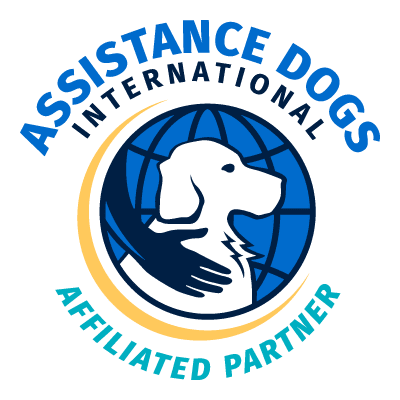
CANCELLATION POLICY
For the Event, Entrant may transfer their registration to another individual without any charge, provided that any such individual will be bound by these terms and conditions. Cancellations by Entrant on or before July 1, 2024 prior to the Event are refundable up to 90% of all funds received. If Entrant cancels registration between July 1, 2024 and August 1, 2024, PPSD will refund up to 50% of all funds received. If Entrant cancels after August 1, 2024, PPSD will be obliged to charge the full fee. Entrant must notify Patriot PAWS Service Dogs in writing of a cancellation, or Patriot PAWS Service Dogs will be obliged to charge the full fee. If the Event is must be postponed, Entrant’s registration will automatically roll over to the new date and platform. Entrant may request a refund in connection with the postponement or cancellation of the Event within one month following such postponement or cancellation. Patriot PAWS Service Dogs shall not be liable to attendee for any damages, costs, or losses incurred, such as transportation costs, accommodations costs, or financial losses.
